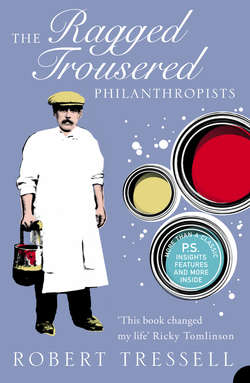Читать книгу The Ragged Trousered Philanthropists - Robert Tressell - Страница 11
Conclusion
ОглавлениеThe Ragged Trousered Philanthropists brims with ideas. Although written in the first decade of the twentieth century much of it still applies today. The economic revolution of the 1980s has led to an increase in poverty and greater job insecurity. There is fierce debate about whether ‘popular’ culture is a distraction from the ‘real’ problems or whether it can be a source of opposition to the dominant meanings in our society. Similarly, discussion rages over whether ‘high’ culture is elitist, or whether it answers the need for a felt depth in experience which is not catered for by the institutions of post-industrial capitalism. Tressell’s novel has much to say about all these issues. It portrays, in unremitting detail, the crushing despair of poverty, the brutality of labour relations and the blighting of hope. Its solution is socialism. But, like many of the ideas in the novel, socialism receives contradictory treatment and its relation to ‘high’ culture is certainly problematic.
The problems of the book should not be allowed to detract from its achievement of marrying art and politics in the English novel. Traditionally, these have been kept apart; art invites contemplation, politics action. This obscures the relation between them. Both evaluate life and, in finding it wanting, endeavour to endow it with significance. Socialism, wrote Arnold Wesker, ‘isn’t about talking all the time, it’s living, it’s singing, it’s dancing, it’s being interested in what [is] go[ing] on around you, it’s being concerned about people and the world.’14
Properly understood, politics makes good the promise of art. To this end The Ragged Trousered Philanthropists issues an emphatic challenge: ‘Every man who is not helping to bring about a better state of affairs for the future is helping to perpetuate the present misery and is therefore the enemy of his own children’ (pp.131-132). Such forthrightness cannot be ignored. It demands we learn more about the world, examine our consciences and evaluate our habits. It also demands we recognise the extent of our obligations and responsibilities, and then act accordingly. The novel, in short, invites us to live, in the largest sense of that word.
GARY DAY
November 1996
